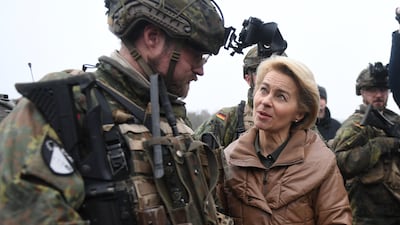A deal has been reached for Ursula von der Leyen to become the next Nato Secretary General and the first woman to head the alliance, The National understands.
The year-long extension of incumbent Jens Stoltenberg’s tenure has been arranged so Ms von der Leyen can finish her five-year term as President of the European Commission in 2024, a Nato insider has said.
Having developed a strong relationship with US President Joe Biden’s administration, she has the vital backing of Washington.
A fluent French and English speaker, the German politician also has the support of French President Emmanuel Macron who is keen to have a strong EU presence inside the alliance.
The previous two Nato leaders have come from countries – Norway and Denmark – that are not as committed to the EU project as others.
“There is in the United States a strong support for Ursula von der Leyen,” said the Nato insider. “She has a very close relationship with the Americans and they’ve been working closely together on China, on data and greening the economy. The Americans like her.”
Ms von der Leyen, 64, allegedly told the Americans she could not leave her post before next year, so Washington persuaded Mr Stoltenberg, who is from Norway, to extend by a year.

Another key issue was that major European powers want a strong pro-Brussels candidate.
“The French in particular, who have got a lot of support from the other EU countries, want this,” the Nato source said. “As a result of Ukraine, the Europeans are spending a lot of money on ammunition and kit and the EU and Nato are working closer together so they are saying ‘we want a Secretary General who represents the EU in Nato’.”
The leader is not chosen by a formal election but rather by a consensus established among Nato’s 31 members, with countries apparently allowed to veto particular candidates.
A former front runner for the job was Britain’s Defence Secretary Ben Wallace but he admitted late last month that it was “not going to happen”.

Despite being a popular candidate among East European nations, given his strong support for Ukraine, Mr Wallace lacked the key criteria of being a former prime minister or equivalent.
He also lacked fulsome support from the US and French leaders.
Previously, prime ministers of smaller nations have left their jobs in favour of becoming leader of the 31-nation alliance, one of the most powerful unelected political posts.
“Nato sees the virtues of prime ministers because if you’re dealing with Donald Trump or [Recep Tayyip] Erdogan you are at their level,” said former Nato deputy assistant secretary general Dr Jamie Shea.
“A former prime minister just picks up the phone and they’re immediately on to the situation. That’s the value of a prime minister's office, the connections, the contacts, the address book. They're also used to running a multi-department government.”
While Ms von der Leyen, who is married with seven children, has navigated the EC presidency competently, there has been significant criticism of her previous five years as Germany’s defence minister.
“There is neither enough personnel nor material, and often one confronts shortage upon shortage,” said Hans-Peter Bartels, an opposition MP, when she was appointed EC President. “The troops are far from being fully equipped.”

Rupert Scholz, who served as defence minister under former German chancellor Helmut Kohl, also described the Bundeswehr’s condition as “catastrophic.”
“The entire defence capability of the federal republic is suffering, which is totally irresponsible,” he said.
Germany’s weak defence was exposed by Russia’s invasion of Ukraine, although an emergency $100 billion boost could improve its strength.
There is also a suggestion that given the number of serving and former female leaders in Europe that the top Nato job should go to a woman.
Other candidates mentioned include Estonian Prime Minister Kaja Kallas, Danish Prime Minister Mette Frederiksen and Slovak President Zuzana Caputova.
“Europe now has quite a large number of female leaders so there’s even less of an excuse for not being able to find a woman as Secretary General,” said Dr Shea.


